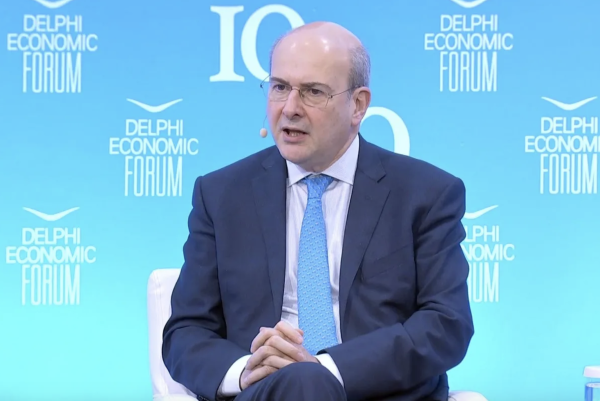
In the midst of the Greek debt crisis, Dr Holger Schmieding, Chief Economist of the oldest (since 1590) German bank, Berenberg, examining the effects of the “Varoufakis effect”, as he called it in the first half of 2015, ruled that it is rare that a new government, as the first of Al. Tsipras with Minister of Finance Giannis Varoufakis, has caused so much damage in such a short time.
He himself, in a recent note from Berenberg Bank, reminds us that ten years ago all eyes were on small Greece, as a miserable attempt to restructure its debt in 2011 sparked a huge upheaval in the markets and scenarios of leaving the euro, leading the area on the brink of recession. It should be noted that in 2015, as the eurozone was then institutionally fortified, there was never a risk issue for the euro (as the “bell” tolled only for Greece), while neither the partners and lenders nor the markets were naturally willing to dance to any purpose,” wherever it came from.
Tax cuts
Today, says Holger Schmieding, Greece is part of the solution, not the problem. For the first time, it is starring, as it is one of the few economies that returned to pre-coronavirus levels as early as the second quarter of 2021 and is in fact about half a year ahead of the eurozone average.
Reacting to the stronger-than-expected growth and fiscal space being created, Prime Minister Kyriakos Mitsotakis announced further tax cuts, equivalent to 1.9% of GDP, for both 2021 and 2022, with the result that Greece is likely to enter a virtuous circle, Berenberg estimated, as just as excessive tax increases had strangled parts of the economy during the crisis, tax cuts might boost supply and demand at the same time.
However, as Holger Schmieding observes, Greece remains a special case, and even if growth exceeds 6% this year, the country’s real GDP in 2021 will still be 29% lower than it was before the 2007 crisis. and slightly higher than the levels it was in 1998, ie before the advent of the euro, at a time when the eurozone economy at average levels grew by almost 33%.
Growth dynamics
The above data show, as he states, both the extent of the 10-year crisis and the dynamics of growth of the Greek economy, if the country implements the right policies.
In fact, he notes that other countries can now take lessons from Greece. Initially the data show that the disturbance must be reduced more quickly and decisively, otherwise it can get out of control. The fact that at the beginning of the pandemic the policy makers in Greece took the appropriate steps, when the coronavirus hit the developed world and caused great turmoil in the markets, remains a permanent achievement.
Another lesson from Greece concerns the fact that the country can now loosen its fiscal leashes, because development-friendly reforms have boosted supply capacity and formal sector creditors are keeping Greek debt service costs at very low levels.
Following the lockdowns, fiscal policies should focus on job creation through public investment and competitive corporate tax rates, in order to encourage private investment, as Greece is doing today, the German bank notes. Growth-friendly policies, which boost supply, ultimately matter more than those that focus only on demand.
Deficits, debt
However, the Greek economy is recovering rapidly, with its performance in the second quarter of 2021 ranking it in a total of 9 EU-27 member states with real GDP higher than pre-pandemic levels. Nevertheless, the better-than-expected performance of the Greek economy, both in terms of the size of the recession in 2020 and in terms of the size of the recovery in the first half of 2021, was accompanied by very high budget deficits and an increase in public debt. Thus, economists say, the transition of the economy from 2023 to the path of fiscal discipline from the path of fiscal relaxation, without high costs for growth, is a big bet for those who pursue economic policy.
However, after surprise data (+ 16.2%) of the 2nd quarter, where Greek GDP was 0.7% higher than pre-pandemic levels, economists from foreign and Greek banks as well as international analysts “see” double-digit GDP growth (in the region of + 12%) in the third quarter, while 80% of economic indicators are in a phase of strong recovery. and tourism revenues are expected to hover over 12 billion euros this year (from 18 billion euros in 2019 and 6 billion euros in 2020), do not exclude that growth in 2021 (after 5% -6% in the 4th quarter) may exceed 8%, well above the new forecast of 5.9% of the government. Total exports of goods and services are moving at historically high levels in terms of both GDP and value, while they are expected to be even higher in 2022. The Greek business sector is moving dynamically in 2021, which is estimated to cover a large extent during the year the sales losses of the pandemic (amounting to approximately € 40 billion).
Positive prospects
The conditions for a strong recovery of private fixed capital investments are gradually beginning to be met, as well as the possible reflection of the positive prospects of the economy in the valuations of Greek assets and bonds.
Foreign companies proceeded to a barrage of upgrades of the prospects of the Greek economy. Capital Economics raised the growth bar at 8.5% this year for Greece, compared to 8.6% for Scope Ratings. UBS also noted that the data for the second quarter show that Greece’s GDP has fully recovered from the pandemic shock, revising its growth forecast to 7.9% this year (from 6.6% previously) and 6% in 2022 (from 5% previously).
JP Morgan speaks of a “total recovery” of the Greek economy to pre-coronary levels from the surprise data in the second quarter, where Greek GDP was almost 1% higher than pre-pandemic levels, while the GDP of the eurozone remained 2.5% lower than the levels where it was in the 4th quarter of 2019, that is, before the pandemic “hit”. According to Moody’s Analytics, Greece “is experiencing an exemplary recovery after COVID-19”, while the growth rate in 2021 will reach 8.2% compared to 5.1% in 2022.
Unprecedented support
On the other hand, it is estimated that the country is entering a 5-year upward cycle of strong growth, as flows from the Recovery Fund and the Multiannual Financial Framework provide unprecedented combined support. The financing and the final expenditure in the period 2021-2026 will reach from the Recovery Fund up to 60 billion euros (€ 18 billion in grants and € 13 billion in loans, while up to € 29 billion concern private funds and bank loans), while 41 billion euros are expected through the Multiannual Financial Framework.
That is, the annual financial flows will be three times higher than in the previous 20 years. In fact, these funds are enough to cover the investment gap that was created in the country during the years of the 10-year crisis that reached 97 billion euros.
The banking system also looks ready for a multidimensional role, as non-performing exposures will be in single digits in 2022, while lending to the private sector, which reached 7 billion euros in the period 2020 – 30.6.2021, is expected to increase significantly in the coming years by financing the economy.
Latest News

FM Gerapetritis Calls for Unified EU Response to Global Crises at EU Council
"Europe is navigating through unprecedented crises — wars, humanitarian disasters, climate emergencies," he stated.

Holy Week Store Hours in Greece
Retail stores across Greece are now operating on extended holiday hours for Holy Week, following their Sunday opening on April 13. The move aims to accommodate consumers ahead of Easter, but merchants remain cautious amid sluggish market activity.

Green Getaway Ideas for Easter 2025 in Greece
Celebrate Easter 2025 in Greece the sustainable way with eco-farms, car-free islands, and family-friendly getaways rooted in nature and tradition.

Civil Protection Minister Details Summer Firefighting Plans at Delphi Forum
At the 10th Delphi Economic Forum, Minister of Climate Crisis and Civil Protection Yiannis Kefalogiannis discussed Greece's plans for the upcoming fire season.

How Shops and Markets Will Operate During Easter Holy Week
The Easter holiday schedule has been in effect since April 10, with retail stores open Palm Sunday, and most supermarkets also operating to meet consumer demand for Easter shopping

Why Is the French Aircraft Carrier Charles De Gaulle in Piraeus?
Docking in Piraeus after a four-month deployment in the Indo-Pacific region, the admiral of the aircraft carrier the Charles de Gaulle says, "Greece is our best partner in the Mediterranean."

Riots and Vandalism in Downtown Athens Exarcheia Region
Night of unrest in downtown Athens' region of Exarcheia – 11 Cars Burned, 72 Detentions

Truth Team: Is the PM and his team telling the truth, the whole truth and nothing but the truth?
The Greek government spokesman noted that "a private individual received payment from other private individuals, and for some people this is a horrifying revelation."

Mayor of Athens Announces Strategy to Address Housing Crisis
Athens Mayor Haris Doukas outlined a series of municipal interventions aimed at tackling the housing crisis during a public event co-hosted with the University of Athens

Hatzidakis at Delphi Forum: Train Reform Bill to Cabinet on April 28
The Deputy Prime Minister stated that a draft bill concerning the Hellenic Railways Organization (OSE) will be brought before the cabinet on April 28

























![Εξοχική κατοικία: Κέρδη από την αξιοποίηση στην Ελλάδα – Οι αποδόσεις των νεόδμητων [γραφήματα]](https://www.ot.gr/wp-content/uploads/2025/04/paros-768x512-1-600x400.jpg)















 Αριθμός Πιστοποίησης
Αριθμός Πιστοποίησης